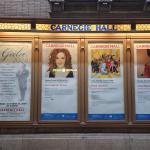In the closing chapter of C.S. Lewis’s Out of the Silent Planet, (the story of Dr. Ransom’s adventure in Mars) the narrator explains that it was Dr. Ransom’s idea, instead of publicizing this adventure in terms of fact, to relate it in the form of fiction: “It was Dr. Ransom who first saw that our only chance was to publish in the form of fiction what would certainly not be listened to as fact.”
The narrator goes on to quote Dr. Ransom: “…what we need for the moment is not so much a body of belief as a body of people familiarized with certain ideas.”
The narrator, of course, gives a counterargument: “To my objection that if accepted as fiction it would for that very reason be regarded as false, he replied that there would be indications enough in the narrative for the few readers – the very few – who at present were prepared to go further into the matter.”
In others word, Dr. Ransom argues, the language of narrative is, for our culture, perhaps the most effective way for the transmission of ideas.
Dr. Ransom’s insistence that fictional narrative be employed to communicate his actual experience assumes that, as humans, we are held accountable by that for which we are trying to give an account. The idea that there is, in reality, a metanarrative – a Story that both transcends and informs our stories – has been widely dismissed, but I propose that human culture is in much need of metanarrative – if we can ever claim to know anything at all – and that the language of narrative will lead us to embrace metanarrative.
But what is it about the language of narrative’s transmission of knowledge that causes Dr. Ransom to say that it is the preferable method for articulating an actual experience in Mars? Why not present this information as a factual account, using the language of empirical evidence or even the language of religion?
First, the language of narrative attempts to bring all accounts of human experience – the philosophical, the scientific, the historical, the phenomenological, the religious, the mystical, etc. – to the same level. The language of science presents itself as more certain than the language of narrative, and thus it is often viewed as a more reliable source for knowledge. The language of religion presents itself as rigid and apodictic, thereby leaving little room for the imagination to contextualize its dogma to the reality – often incongruent with the dogma – that it encounters on a daily basis.
The language of narrative insists that science and religion are themselves narratives seeking to account for shared human experience, neither inherently truer than the other. Science tells a story, as does dogma. If neither is inherently truer than the other, then there must be some outer entity, or a metanarrative, that accounts for why each narrative simultaneously contains both truth and error and why each is different from the others. Each contains truth because its tellers are themselves a part of the metanarrative. Each contains error because those within the metanarrative cannot see the whole story and are therefore limited in their account.
Each narrative is different in appearance because each enters the metanarrative from a different vantage point. Thus, the narrative of science can make true claims, as can the narrative of religion, and yet appear different.
Second, because of this limitation, it follows that the language of narrative’s power comes not chiefly by Man’s ability to draw near to the metanarrative but by the metanarrative’s intrusion into the affairs of Man.
It is this intrusion of metanarrative into the affairs of Man to which Dr. Ransom is appealing, I think, when he says that “there would be indications enough in the narrative for the few readers – the very few –who at present were prepared to go further into the matter.” In other words, these few would see certain realities within the narrative – realities that involve the entire human instead of merely the mind, the body, or the spirit – that correspond to realities outside the narrative and would thus be nearer to discovering a particular intrusion of metanarrative.
The Christian tradition has claimed that its narrative – and it should be thought of as a narrative – is not merely an account of shared human experience but also an account of such an intrusion of the metanarrative.
I urge adherents and non-adherents to the Christian tradition alike to treat our accounts of human experience as narratives that bear a claim to truth, comparing and contrasting each alongside the others, assessing which does the most reasonable work of accounting for shared human experience and for intrusions of the metanarrative into the affairs of Man.
When we do this, we are essentially trusting in the truth to reveal itself rather than in our ability to fully account for it. It is this sort of trust in the intrusion of the metanarrative toward which, I think, Dr. Ransom and Lewis are urging us.















